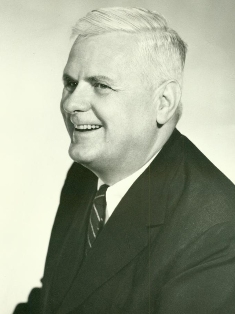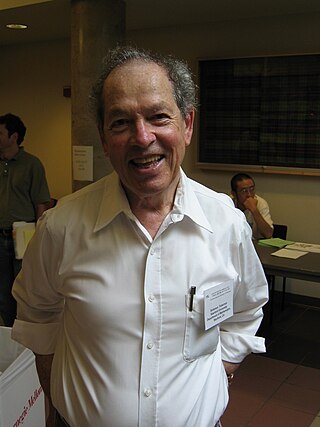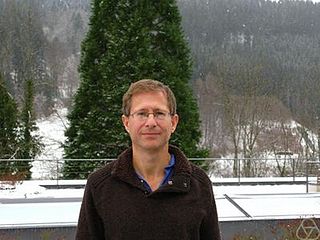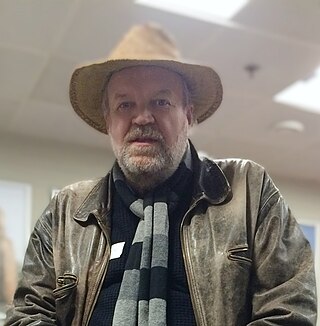In computability theory, the Church–Turing thesis is a thesis about the nature of computable functions. It states that a function on the natural numbers can be calculated by an effective method if and only if it is computable by a Turing machine. The thesis is named after American mathematician Alonzo Church and the British mathematician Alan Turing. Before the precise definition of computable function, mathematicians often used the informal term effectively calculable to describe functions that are computable by paper-and-pencil methods. In the 1930s, several independent attempts were made to formalize the notion of computability:

Alonzo Church was an American computer scientist, mathematician, logician, and philosopher who made major contributions to mathematical logic and the foundations of theoretical computer science. He is best known for the lambda calculus, the Church–Turing thesis, proving the unsolvability of the Entscheidungsproblem, the Frege–Church ontology, and the Church–Rosser theorem. Alongside his doctoral student Alan Turing, Church is considered one of the founders of computer science.

Alfred Tarski was a Polish-American logician and mathematician. A prolific author best known for his work on model theory, metamathematics, and algebraic logic, he also contributed to abstract algebra, topology, geometry, measure theory, mathematical logic, set theory, and analytic philosophy.
In the philosophy of mathematics, ultrafinitism is a form of finitism and intuitionism. There are various philosophies of mathematics that are called ultrafinitism. A major identifying property common among most of these philosophies is their objections to totality of number theoretic functions like exponentiation over natural numbers.

Solomon Feferman was an American philosopher and mathematician who worked in mathematical logic. In addition to his prolific technical work in proof theory, computability theory, and set theory, he was known for his contributions to the history of logic and as a vocal proponent of the philosophy of mathematics known as predicativism, notably from an anti-platonist stance.

Hao Wang was a Chinese-American logician, philosopher, mathematician, and commentator on Kurt Gödel.
The Lwów–Warsaw School was an interdisciplinary school founded by Kazimierz Twardowski in 1895 in Lemberg, Austro-Hungary.

Wilfrid Augustine Hodges, FBA is a British mathematician and logician known for his work in model theory.
David William Miller was an English philosopher and prominent exponent of critical rationalism. He taught in the Department of Philosophy at the University of Warwick in Coventry, UK. where he was a Reader in Philosophy. He had been an Honorary Treasurer of the British Society for the Philosophy of Science.

Ehud Hrushovski is a mathematical logician. He is a Merton Professor of Mathematical Logic at the University of Oxford and a Fellow of Merton College, Oxford. He was also Professor of Mathematics at the Hebrew University of Jerusalem.
Robin Oliver Gandy was a British mathematician and logician. He was a friend, student, and associate of Alan Turing, having been supervised by Turing during his PhD at the University of Cambridge, where they worked together.

The Association for Symbolic Logic (ASL) is an international organization of specialists in mathematical logic and philosophical logic. The ASL was founded in 1936, and its first president was Curt John Ducasse. The current president of the ASL is Phokion Kolaitis.

(John) Martin Elliott Hyland is professor of mathematical logic at the University of Cambridge and a fellow of King's College, Cambridge. His interests include mathematical logic, category theory, and theoretical computer science.

John Corcoran was an American logician, philosopher, mathematician, and historian of logic. He is best known for his philosophical work on concepts such as the nature of inference, relations between conditions, argument-deduction-proof distinctions, the relationship between logic and epistemology, and the place of proof theory and model theory in logic. Nine of Corcoran's papers have been translated into Spanish, Portuguese, Persian, and Arabic; his 1989 "signature" essay was translated into three languages. Fourteen of his papers have been reprinted; one was reprinted twice.

Janina Hosiasson-Lindenbaum was a Polish logician and philosopher. She published some twenty research papers along with translations into Polish of three books by Bertrand Russell. The main focus of her writings was on foundational problems related to probability, induction and confirmation. She is noted especially for authoring the first printed discussion of the Raven Paradox which she credits to Carl Hempel and the probabilistic solution she outlined to it. Shot by the Gestapo in 1942, she, like her husband Adolf Lindenbaum, and many other eminent representatives of Polish logic, shared the fate of millions of Jews murdered on Polish soil by the Nazis.

Jouko Antero Väänänen is a Finnish mathematical logician known for his contributions to set theory, model theory, logic and foundations of mathematics. He served as the vice-rector at the University of Helsinki, and a professor of mathematics at the University of Helsinki, as well as a professor of mathematical logic and foundations of mathematics at the University of Amsterdam. He completed his PhD at the University of Manchester under the supervision of Peter Aczel in 1977 with the PhD thesis entitled "Applications of set theory to generalized quantifiers". He was elected to the Finnish Academy of Science and Letters in 2002. He served as a member of the Senate of the University of Helsinki from 2004 to 2006 and the Treasurer of the European Mathematical Society from 2007 to 2014, as well as the Treasurer of the European Set Theory Society since 2012. Jouko Väänänen received the Magnus Ehrnrooth Foundation Prize in mathematics on April 29, 2024.

Valeria Correa Vaz de Paiva is a Brazilian mathematician, logician, and computer scientist. Her work includes research on logical approaches to computation, especially using category theory, knowledge representation and natural language semantics, and functional programming with a focus on foundations and type theories.
Philip David Welch is a British mathematician known for his contributions to logic and set theory. He is Professor of Pure Mathematics at the School of Mathematics, University of Bristol. He is currently President of the European Set Theory Society (2021) and the Coordinating Editor of the Journal of Symbolic Logic (2016), and was President of the British Logic Colloquium from 2017 to 2022.
Patricia A. Blanchette is an American philosopher and logician, the McMahon-Hank Professor of Philosophy at the University of Notre Dame. She specializes in the history of philosophy, history of logic, philosophy of logic, philosophy of mathematics, and philosophy of science, and is the author of a book on the logic of Gottlob Frege.
Alice Geraldine Baltina ter Meulen is a Dutch linguist, logician, and philosopher of language whose research topics include genericity in linguistics, intensional logic, generalized quantifiers, discourse representation theory, and the linguistic representation of time. She is a professor emerita at the University of Geneva.











